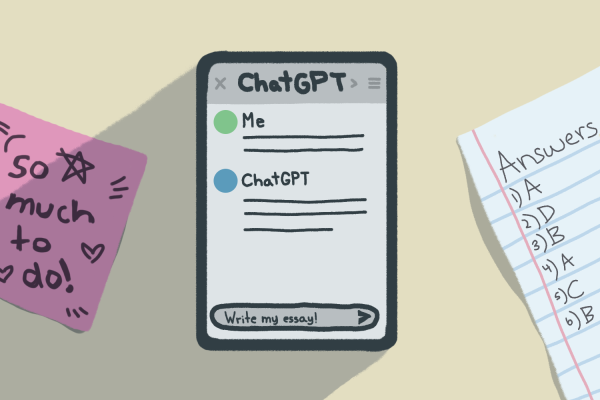The Dangers of Cyberstalking
A Verrado student texting someone a message.
March 3, 2023
When most think of cyberbullying they think of someone sending constant mean messages online. These bullies hope to get away with this and to anger the victim. Imagine being sent hateful text messages constantly. Your thoughts are spinning everywhere and your feelings are changing continuously. From angry, afraid, confused, and upset. Your heart is racing a mile a minute and your palms are sweaty. Your wondering who is up at 3 am sending me these messages? You don’t know what to do.
Most don’t think of cyberbullying as someone following your every move and sending you threats throughout the day. This specific kind of cyberbullying is called cyberstalking. Cyberstalkers track your location, computer or phone, and internet use. All while sending unwanted and harassing text messages. Cyberstalkers are deliberate and persistent with their messages and stalking skills. Being able to text your multiple times a day and seeing where you work or where you live.
There isn’t a specific reason why someone would want to cyberbully someone but usually, it’s because there insecure or jealous of the victim. Mrs. Palmgren says, “ Generally when someone is cyberbullying someone it’s because [these people are] hurting themselves or they want to feel powerful.”
Cyberbullying includes sending private information that’s posted on social media or sent to others in messages. The private information being posted/sent can lead to the victim feeling humiliated, embarrassed, or frightened to participate in daily activities. Unfortunately, anyone can be a victim of cyberbullying, but some are targeted more frequently: people with disabilities, mental illnesses, young adults, children, etc. Miss. Booth says, “I encourage you not to respond or “feed the trolls” online. I encourage you to block the person/people who are bullying you.”
The anonymity of someone cyberbullying allows bullies to avoid facing the victims and think they can get away with it. The average age of a person who is most likely to get cyberbullied is from ages 8-17. But 60% of teens are more likely to witness cyberbullying online. Not only this but girls are more likely to be cyberbullied than boys. When cyberbullied do not respond it will only egg them on. Block the person who is cyberbullying you immediately.
Cyberbullying can lead to legal consequences. Sending or posting inappropriate photos/videos of an individual can result in juvenile punishment. Also, if the cyberbully is threatening your physical safety or serious damage to personal property can result in 6 months in jail, a 3600 dollar fine, and 3 years of probation.
Mr. Lees says, “Tell an adult! Your parent, teachers, your counselor, and administrator. We don’t know it’s happening unless you tell someone.” Reporting an incident like this to the school resource officer allows them to investigate. Not only this but you can talk to your counselors or Miss. Booth. They want to help you.
Unless the level of cyberbullying is disrupting the learning process of the students there will be a variety of consequences. Disrupting the learning process means the student may be skipping class or failing their classes. Cyberbullying is hard for schools to supervise because it happens outside of school.
Cyberbullying still takes place and some students may or may not understand it. Kasson a Verrado student, says, “I have heard of it but never seen it. I have never actually seen anyone being cyberbullied.”
A Verrado student says,” Coming from a personal experience it makes you feel bad about yourself. Even if you act like you are happy, you’re not.”

















Kim • Mar 6, 2023 at 9:45 AM
Very well done
Sabrina Booth • Mar 3, 2023 at 2:53 PM
Great job!!!
Joseph Seymour • Mar 3, 2023 at 1:37 PM
Well done